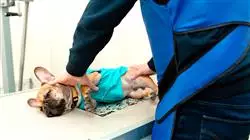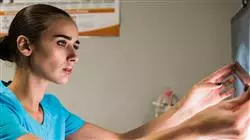University certificate
The world's largest faculty of veterinary medicine”
Introduction to the Program
Specialize in Radiological Diagnosis in Neurology and improve the health of pets"

Quality radiological imaging in neurology is essential in order to achieve a comprehensive assessment of the neurological system. Therefore, special attention must be paid to both the radiographic technique and the positioning of the animal. For these cases, it is recommendable to conduct the radiographs to assess the neurological system under sedation, using the appropriate positioning accessories.
In addition, we can diagnose a large number of conditions, both congenital and acquired using spinal radiology. Myelography is a contrasting technique used for the evaluation of the spine. In this program TECH wants to perfect the technique, both for cisternal and lumbar myelography, and we will define the cases in which it should be performed, the risks involved and the pathological alterations that can be observed.
Regarding the skull, it should be taken into account that it is a very complex structure meaning radiological assessment can be complicated. Therefore, radiographs provide valuable information on the head's bony structure.
In short, it is a program based on scientific evidence and daily practice, with all the nuances that each professional can contribute, so that the student can keep it in mind with the bibliography and enriched by the critical evaluation that every professional must have.
Throughout this course, the student will learn about all the current approaches to the different challenges posed by their profession. A high-level step that will become a process of improvement, not only on a professional level, but also on a personal level. In addition, TECH assumes a social commitment: to help the specialization of highly qualified professionals and to develop their personal, social and labor skills during the development of the same. And, to do so, it will not only take you through the theoretical knowledge offered, but will show you another way of studying and learning which is more organic, simpler and more efficient. It works to maintain motivation and to create a passion for learning; it encourages thinking and the development of critical thinking.
We offer you the perfect combination of theory and practice so that you have all the necessary resources at your disposal to allow you a deep and exhaustive study of the subject"
This Postgraduate certificate in Radiological Diagnosis in Neurology in Small Animals contains the most complete and up-to-date educational program on the market. The most important features of the program include:
- The development of case studies presented by experts in Veterinary Radiology
- The graphic, schematic, and eminently practical contents with which they are created, provide scientific and practical information on the disciplines that are essential for professional practice
- Latest developments in Veterinary Radiology
- Practical exercises where self-assessment can be used to improve learning
- Special emphasis on innovative methodologies in Veterinary Radiology
- Theoretical lessons, questions to the expert, debate forums on controversial topics, and individual reflection assignments
- Content that is accessible from any fixed or portable device with an Internet connection
Our 100% online program offers you the possibility of studying from wherever you choose, without the need to physically move to a center"
TECH's teaching staff includes professionals belonging to the veterinary field, who contribute their work experience to this training, as well as renowned specialists from reference societies and prestigious universities.
The Multimedia Content, elaborated with the latest Educational Technology, will allow the Professional a situated and contextual learning, that is to say, a Simulated Environment that will provide an immersive specialization programmed to train in real situations.
This program is designed around Problem Based Learning, whereby the professional must try to solve the different professional practice situations that arise during the academic program. For this purpose, the professional will be assisted by an innovative system of interactive videos made by renowned and experienced experts in Veterinary Radiology.
We give you the opportunity to study with the most didactic methodology on the market. A unique opportunity that will move you forward in just a short amount of time"

We offer you an innovative program in which you will find real case studies that will allow you to conduct a more contextual study"
Why study at TECH?
TECH is the world’s largest online university. With an impressive catalog of more than 14,000 university programs available in 11 languages, it is positioned as a leader in employability, with a 99% job placement rate. In addition, it relies on an enormous faculty of more than 6,000 professors of the highest international renown.

Study at the world's largest online university and guarantee your professional success. The future starts at TECH”
The world’s best online university according to FORBES
The prestigious Forbes magazine, specialized in business and finance, has highlighted TECH as “the world's best online university” This is what they have recently stated in an article in their digital edition in which they echo the success story of this institution, “thanks to the academic offer it provides, the selection of its teaching staff, and an innovative learning method aimed at educating the professionals of the future”
A revolutionary study method, a cutting-edge faculty and a practical focus: the key to TECH's success.
The most complete study plans on the university scene
TECH offers the most complete study plans on the university scene, with syllabuses that cover fundamental concepts and, at the same time, the main scientific advances in their specific scientific areas. In addition, these programs are continuously being updated to guarantee students the academic vanguard and the most in-demand professional skills. In this way, the university's qualifications provide its graduates with a significant advantage to propel their careers to success.
TECH offers the most comprehensive and intensive study plans on the current university scene.
A world-class teaching staff
TECH's teaching staff is made up of more than 6,000 professors with the highest international recognition. Professors, researchers and top executives of multinational companies, including Isaiah Covington, performance coach of the Boston Celtics; Magda Romanska, principal investigator at Harvard MetaLAB; Ignacio Wistumba, chairman of the department of translational molecular pathology at MD Anderson Cancer Center; and D.W. Pine, creative director of TIME magazine, among others.
Internationally renowned experts, specialized in different branches of Health, Technology, Communication and Business, form part of the TECH faculty.
A unique learning method
TECH is the first university to use Relearning in all its programs. It is the best online learning methodology, accredited with international teaching quality certifications, provided by prestigious educational agencies. In addition, this disruptive educational model is complemented with the “Case Method”, thereby setting up a unique online teaching strategy. Innovative teaching resources are also implemented, including detailed videos, infographics and interactive summaries.
TECH combines Relearning and the Case Method in all its university programs to guarantee excellent theoretical and practical learning, studying whenever and wherever you want.
The world's largest online university
TECH is the world’s largest online university. We are the largest educational institution, with the best and widest online educational catalog, one hundred percent online and covering the vast majority of areas of knowledge. We offer a large selection of our own degrees and accredited online undergraduate and postgraduate degrees. In total, more than 14,000 university degrees, in eleven different languages, make us the largest educational largest in the world.
TECH has the world's most extensive catalog of academic and official programs, available in more than 11 languages.
Google Premier Partner
The American technology giant has awarded TECH the Google Google Premier Partner badge. This award, which is only available to 3% of the world's companies, highlights the efficient, flexible and tailored experience that this university provides to students. The recognition as a Google Premier Partner not only accredits the maximum rigor, performance and investment in TECH's digital infrastructures, but also places this university as one of the world's leading technology companies.
Google has positioned TECH in the top 3% of the world's most important technology companies by awarding it its Google Premier Partner badge.
The official online university of the NBA
TECH is the official online university of the NBA. Thanks to our agreement with the biggest league in basketball, we offer our students exclusive university programs, as well as a wide variety of educational resources focused on the business of the league and other areas of the sports industry. Each program is made up of a uniquely designed syllabus and features exceptional guest hosts: professionals with a distinguished sports background who will offer their expertise on the most relevant topics.
TECH has been selected by the NBA, the world's top basketball league, as its official online university.
The top-rated university by its students
Students have positioned TECH as the world's top-rated university on the main review websites, with a highest rating of 4.9 out of 5, obtained from more than 1,000 reviews. These results consolidate TECH as the benchmark university institution at an international level, reflecting the excellence and positive impact of its educational model.” reflecting the excellence and positive impact of its educational model.”
TECH is the world’s top-rated university by its students.
Leaders in employability
TECH has managed to become the leading university in employability. 99% of its students obtain jobs in the academic field they have studied, within one year of completing any of the university's programs. A similar number achieve immediate career enhancement. All this thanks to a study methodology that bases its effectiveness on the acquisition of practical skills, which are absolutely necessary for professional development.
99% of TECH graduates find a job within a year of completing their studies.
Postgraduate Certificate in Diagnostic Radiology in Neurology in Small Animals
.
If you are a veterinary professional passionate about neurology in Small Animals and you are looking to expand your knowledge and skills in radiological diagnosis, the Postgraduate Certificate in Radiological Diagnosis in Neurology in Small Animals from TECH Global University is the ideal option for you. This Postgraduate Certificate is taught in virtual mode, which allows you to access classes from anywhere and at the time that best suits your schedule. For 1-3 months, you will have the opportunity to immerse yourself in the fascinating world of diagnostic radiology in Neurology in Small Animals, learning from experts in the field through interactive, hands-on virtual classes.
Join the community of specialized veterinary professionals.
In this Postgraduate Certificate, you will gain expertise in the radiological diagnosis of neurological diseases in small animals. You will learn to interpret radiographs, computed tomography (CT) and magnetic resonance imaging (MRI) scans specific to the nervous system, identifying lesions, abnormalities and neurological diseases. In addition, you will learn the most advanced techniques in veterinary imaging and their application in the diagnosis and follow-up of neurological diseases. Upon completion of this Postgraduate Certificate, you will be prepared to excel in your veterinary career with specialized skills and knowledge in diagnostic radiology in Neurology in Small Animals. You will be able to offer your patients quality care and accuracy in the diagnosis of neurological diseases, contributing to improve their health and well-being. Enroll and take your veterinary career to the next level.







